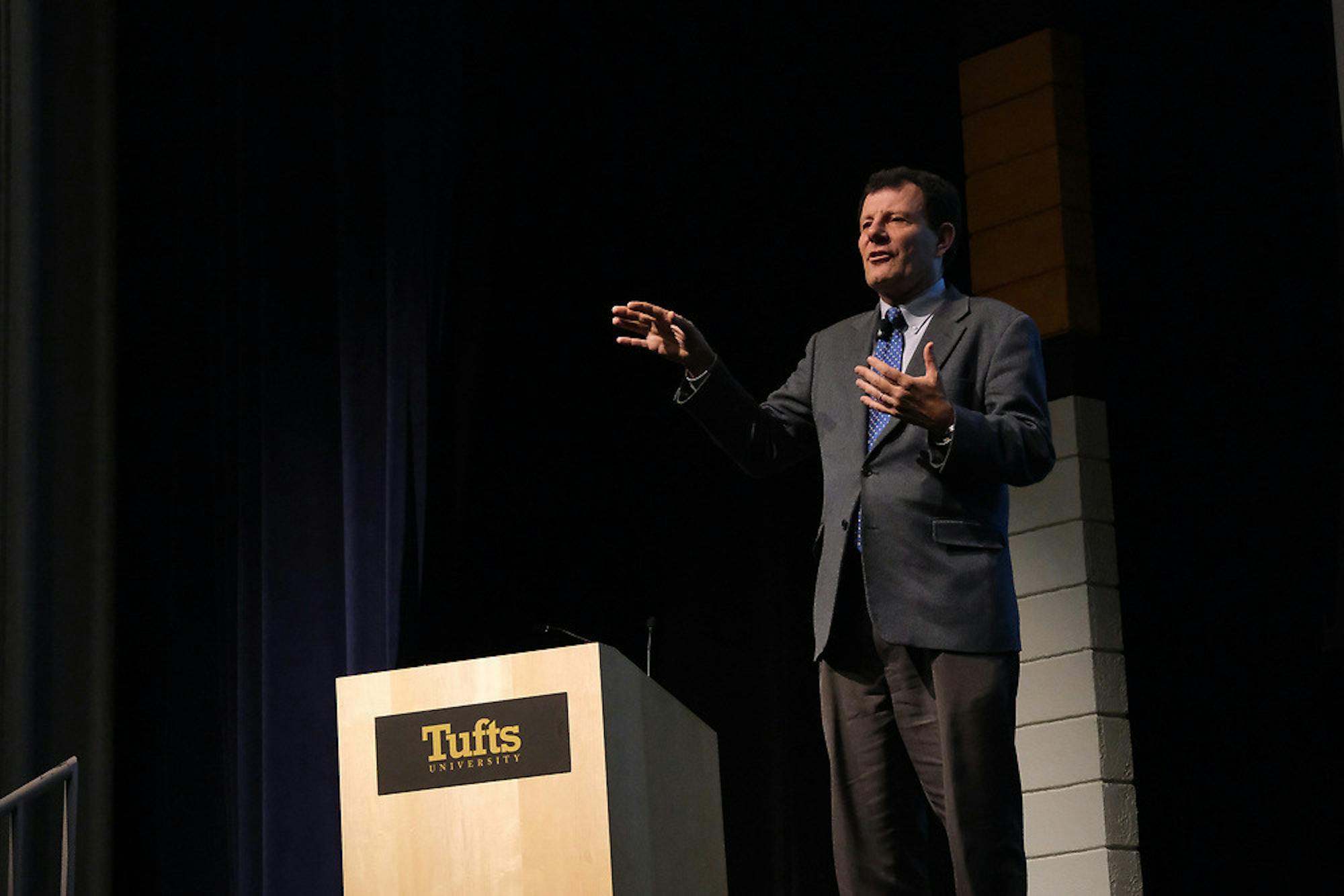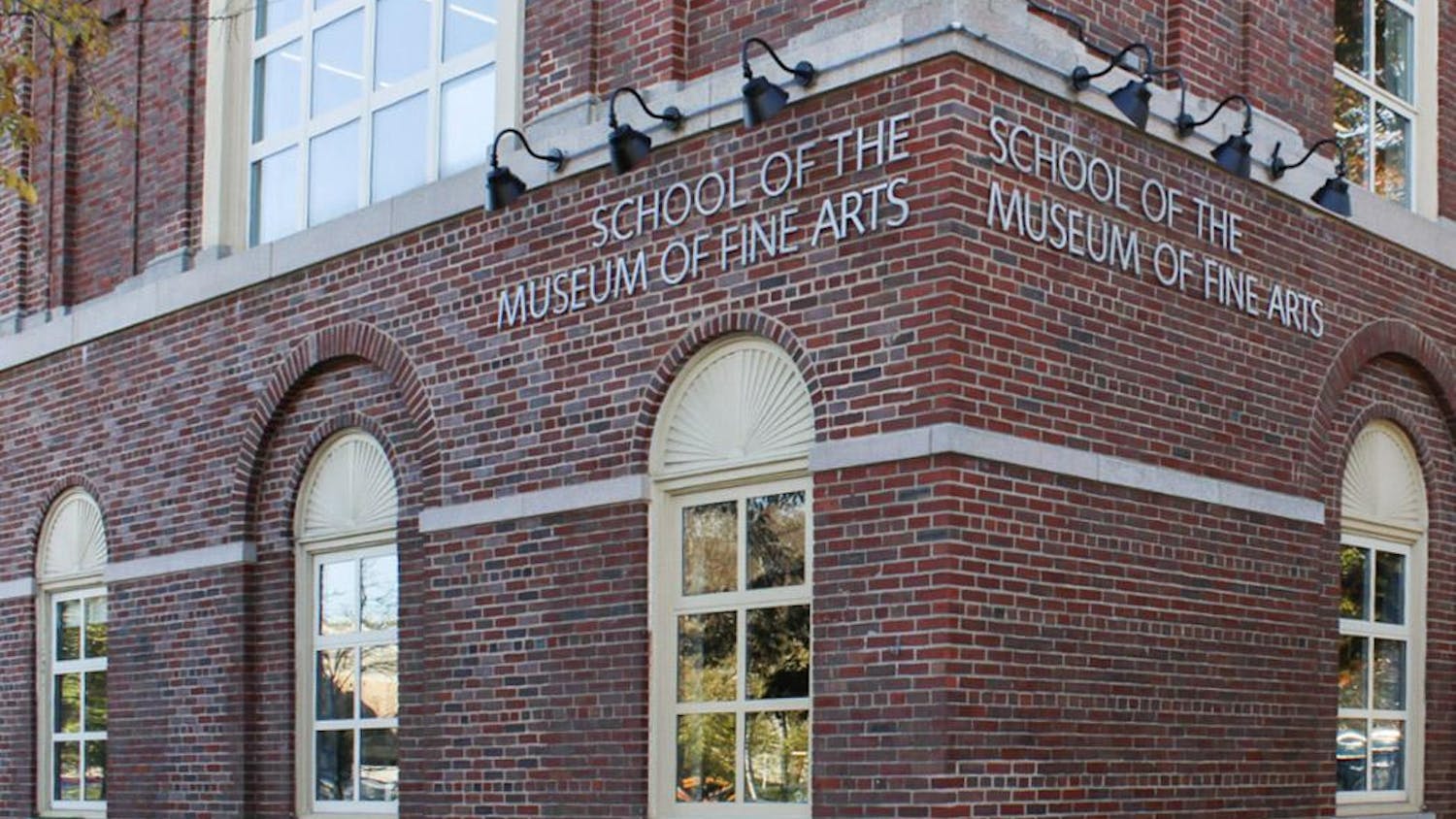Pulitzer Prize-winning journalist Nicholas Kristof presented a lecture on immigration largely focusing on individual narratives yesterday night for the annual Tufts Hillel Merrin Moral Voices Lecture. The event, titled “Covering Immigration In The Trump Era: An Evening With Award Winning New York Times Journalist Nicholas Kristof,” filled Cohen Auditorium to over half its capacity.
Kristof, who has worked for The New York Times since 2001, writes a column on human rights and global affairs. He previously worked as a foreign correspondent and has won two Pulitzer Prizes for his reporting.
Kristof last visited Tufts in 2007 for the second Merrin Moral Voices Lecture, when he gave a talk titled “Raising a Moral Voice.”
The Merrin Moral Voices Lecture is part of a student-driven program led by Tufts Hillel to highlight “moral voices” and inspire students to take positive action in their communities, according to the Hillel website. Each year, the Merrin Moral Voices program invites a speaker to campus to share their experience pursuing social justice issues. Last year, Tufts Hillel invited Cecile Richards, former president of Planned Parenthood, for a lecture on reproductive rights.
Naftali Brawer, Neubauer executive director of Tufts Hillel, introduced the lecture by connecting this year’s theme, immigration, with the Jewish faith and the mission of Tufts Hillel.
“[The Torah] instructs us 36 times to love the stranger,” Brawer said.
After a dedication to Anne HeymanMerrin by Lauren Bloom, assistant director of Tufts Hillel, sophomore Alex Smith introduced Kristof.
Kristof spent the majority of his talk next to the podium, supplementing his words with lecture slides. He said that the topic of immigration directly reflects on personal morals.
“I see this as a way of addressing a larger topic, which is our own communities and our own values,” he said.
Kristof said that America has historically held two differing positions on immigration, one that welcomes immigrants and refugees and another that embraces xenophobia and anti-immigrant rhetoric. He referenced the mistreatment of Catholic and Irish, as well as Japanese internment and hostility toward Jewish refugees.
“We discount the lives and wellbeing of foreigners; we ‘otherize’ them,” he said.
Throughout the presentation, Kristof referenced slides with phrases that people might use to justify ignoring the issue of immigration or opposing immigration, the first of which was, “Why should we care?”
“The best answer to that is to focus on individual stories and the community humanity,” Kristof said.
Kristof told several individual stories throughout his presentation, beginning with the story of Elena, a Honduran girl whose family had fled the threat of gang violence after a gang member forced her into a relationship.
“The idea that we would then send Elena and her family back to that gang … I just find that unconscionable,” he said.
His second point of rebuttal, to the phrase “But immigrants are a burden,” focused on the contributions that immigrants have made to the U.S. He highlighted the story of Tanitoluwa "Tani" Adewumi, an 8-year-old New York state chess champion and Nigerian refugee.
“[That’s] another example of how refugees and immigrants fundamentally are not a burden but enrich the country,” he said.
For the third phrase, “We can’t help everyone. It’s hopeless!,” Kristof pointed out what he called the “backdrop of progress” globally and called for more focus on this progress.
“We in journalism and those in the humanitarian community always focus on the problems,” he said. “If you always focus on the problems, never the progress, you leave people feeling this compassion fatigue.”
He said he has seen progress on many of the human rights issues that he has written about and studied.
Kristof said that the empathy gap between those who are affluent and those who are not is a result of lack of exposure and otherizing, and urged audience members to work to bridge this gap. He told the stories of Olly Neal, the first African-American district prosecuting attorney in Arkansas, as well as of people facing brutal treatment in Myanmar and children starving in Yemen, asking audience members to acknowledge the U.S.’s role in the famine in Yemen.
Kristof referenced his August Times column, titled “Anne Frank today is a Syrian girl,” and related it to current immigration crises.
“Anne Frank today is a Guatemalan girl at the border, Anne Frank is a Yemeni girl,” he said.
For the final phrase, Kristof refuted claims that attempts at addressing the crisis around immigration and refugees are “all just a drop in the bucket.” He told the story of his father’s immigration from eastern Europe to the US, using this as an example of the significance of making a difference in a single life.
“Even if it is a drop in the bucket, I believe in drops in the bucket,” he said. “That is how we fill buckets.”
Kristof took inquiries from the audience in a brief question-and-answer session after the lecture. The first question referred to the impact of economic factors on policymakers’ efforts to push forward policies inclusive for immigrants and refugees. Kristof responded that journalism, specifically photojournalism, is effective in swaying policy. He commented on the power of photos to inspire people to act, as well as the importance of building a fairer economy.
The second question addressed how Kristof’s journalism brings out individuals’ stories while also referencing a broader need for social change. Kristof suggested that storytelling is not enough, stressing the impact of concrete action. He gave an example of an individual’s impact on a larger audience, saying that Tani’s parents donated the money he received to African immigrant families in similar situations to their own.
“The solution is to have more institutionalized, structural ways to address homelessness and child poverty,” Kristof said.
Another question referred to the ethical and moral ramifications of reporting on individuals in difficult situations. Kristof said that he offers assistance, financial and otherwise, to interviewees in need, which has led to ethical concerns among his colleagues.
“Fundamentally, we are humans first and journalists second,” he explained.
In response to another question, Kristof objected to the idea that deeply upsetting images of poverty, war and immigration, referred to as “poverty porn,” are empty attempts to gain empathy. He explained that with the permission of those pictured or their parents, these images can be a powerful way of fighting back.
“Horrifying images end up changing policy,” he said.
Nicholas Kristof discusses immigration, journalism at Hillel-sponsored lecture

As part of the event titled 'Covering Immigration in the Trump Era,' New York Times columnist Nicholas Kristof addresses the audience in Cohen Auditorium on March 26.





